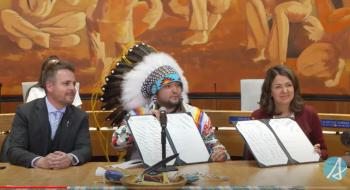Image Caption
Summary
Local Journalism Initiative Reporter
Windspeaker.com
A new addictions recovery community to open sometime next year on the Enoch Cree Nation will provide 75 beds.
Chief Cody Thomas signed a memorandum of understanding with Alberta Premier Danielle Smith yesterday that sees the province commit up to $30 million in capital costs for the new recovery centre.
Smith said her government was also committed to supporting operations of the centre, although she did not specify what that budget figure would be.
The centre, the second of its kind on a First Nation, will have the capacity to support up to 300 people per year. People will be allowed to stay for a full year in order to build life skills and change outcomes when they leave.
Thomas said “to a certain extent” he was willing to consider having some of those beds open for people who are involuntarily placed, some of which could go to people forced into recovery and some of which to people in court-ordered wellness plans.
“If I had a family member that I (saw) was struggling with heroin and overdosing five times in a day, and we were Narcanning them, absolutely I would give them that option,” he said.
Narcan is one brand name for naloxone, which is a medicine made available in kits to first responders and drug users to help people who are overdosing on opioids.
Under a Compassionate Care Intervention Act being considered by Smith’s UCP government, people could be forced into treatment.
Smith said her government had been consulting on the act for a number of months and stressed that involuntary treatment would be a last resort effort.
“The approach we want to take is to give people lots of opportunities to voluntarily choose treatment,” she said.
The province plans to build nine recovery centres and provide 900 beds, free of charge, to people to help them with their recovery. One-hundred-and-fifty beds are to be located on First Nations.
Smith said involuntary treatment may be the only avenue available when people are overdosing “multiple times a day” or repeatedly getting acute care help because of their addictions.
“We have to ask ourselves the question…Do we have an obligation as a society to help them get their individual agency back so that they can make decisions again, so that they are clean and they can make decisions to maintain a life of recovery?” she said.
Smith said the province was looking at a model similar to Portugal’s, which uses a tribunal of commissioners who access experts to determine whether someone “has gotten to a point where they need to be ordered into care.” She said they were still consulting on what the point would be.
A policy brief prepared by the University of Toronto in 2022 said one barrier for Indigenous peoples seeking help to address substance use disorders is the fear of forced treatment.
Smith did not respond to a question as to whether the Compassionate Care Intervention Act would be part of her party’s platform in the upcoming May election.
Thomas said beds at Enoch would be prioritized for First Nations people for which provincial or Indigenous courts set out a wellness plan as part of their treatment.
“A lot of our members and First Nations are going through that court process and it does help give them a hand up instead of a handout. Definitely that is the expectation of this treatment facility,” he said.
Thomas said his community and other First Nations people had suffered greatly throughout the pandemic. He said the addictions recovery facility had the potential to improve the health and wellbeing of his people.
The facility would offer culturally appropriate services for substance abuse and mental health treatment and would be staffed by qualified individuals.
“Through this opportunity with the treatment facility, to have our cultural component involved in it, who knows our people better than us?” said Thomas. “To have a one-year opportunity where it’s going to be a broader conversation on the aftercare piece as well. We’re working towards that. We’re taking action. We have to.”
Mental Health and Addictions Minister Nicholas Milliken said Indigenous people were disproportionately affected by addictions and mental health challenges, and often faced barriers when it came to accessing treatment.
This recovery community on the Enoch Cree Nation, he said, is part of the ongoing efforts of the Edmonton Public Safety and Community Response Task Force to implement initiatives to increase supports for people struggling with addictions.
The first recovery community on a First Nation is expected to be opened in early 2024 by the Blood Tribe.
Never miss a Windspeaker article. Subscribe Today to our new Windspeaker Newsletter!
Local Journalism Initiative Reporters are supported by a financial contribution made by the Government of Canada.

